|
|
|
Sort Order |
|
|
|
Items / Page
|
|
|
|
|
|
|
| Srl | Item |
| 1 |
ID:
084352
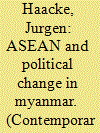

|
|
|
| 2 |
ID:
104349
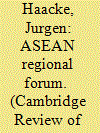

|
|
|
|
|
| Publication |
2011.
|
| Summary/Abstract |
This article examines to what extent the Association of Southeast Asian Nations (ASEAN) Regional Forum (ARF) has moved beyond dialogue to practical security co-operation. Focusing on terrorism, maritime security and disaster relief as key areas of ARF activities in the past few years, the paper offers four arguments: first, while the ARF primarily remains a forum for regional security dialogues and confidence building, its participants have slowly become prepared to proceed with practical security co-operation, albeit only in limited ways. To the extent that desktop and field exercises take place under ARF auspices, most have been organized in the area of disaster relief. This implies, second, that for the most part ARF participants are still pursuing capacity building and operational security responses outside the Forum. Third, the ARF's cautious embrace of practical co-operation is not the outcome of ASEAN's exercise of diplomatic centrality but the result of initiatives pursued by a small group of ASEAN and some non-ASEAN states. Fourth, at least in the short term, any expectations that participants might organize significantly more demanding practical activities under ARF auspices are premature.
|
|
|
|
|
|
|
|
|
|
|
|
|
|
|
|
| 3 |
ID:
094448
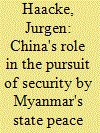

|
|
|
|
|
| Publication |
2010.
|
| Summary/Abstract |
This article focuses on both the opportunities and challenges that the People's Republic of China (PRC) presents for Myanmar's State Peace and Development Council (SPDC) in its quest for security. It does so in the context of significant external pressures on the military regime and its ongoing struggle to consolidate the state. The article argues that though Myanmar's military has successfully relied on Beijing for economic development as well as diplomatic protection against efforts to take the junta to task for its political intransigence in the face of Western demands for a more inclusive political process towards national reconciliation, Beijing's political support is actually more ambiguous than first meets the eye. It also suggests that China's links to the areas in which ethnic armed ceasefire groups formerly making up the Communist Party of Burma exercise significant if not complete authority have complicated efforts by Naypyidaw to impose its perspective on state and nation building along at least part of the Sino-Myanmar border. Rising frustration with perceived Chinese involvement and influence as well as strategic calculations about how to exploit potential opportunities have led the SPDC - in the run-up to the 2010 elections - to explore the possibility of improved relations with Washington and to use force in Kokang despite the risks such a move entails.
|
|
|
|
|
|
|
|
|
|
|
|
|
|
|
|
| 4 |
ID:
046345
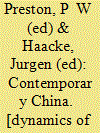

|
|
|
|
|
| Publication |
London, routledgeCurzon, 2003.
|
| Description |
ix, 348p.
|
| Standard Number |
0700716378
|
|
|
|
|
|
|
|
|
|
|
|
Copies: C:1/I:0,R:0,Q:0
Circulation
| Accession# | Call# | Current Location | Status | Policy | Location |
| 046321 | 338.900951/PRE 046321 | Main | On Shelf | General | |
|
|
|
|
| 5 |
ID:
098287
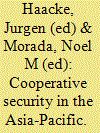

|
|
|
|
|
| Publication |
London, Routledge, 2010.
|
| Description |
xvi, 279p.
|
| Standard Number |
9780415460521, hbk
|
|
|
|
|
|
|
|
|
|
|
|
Copies: C:1/I:0,R:0,Q:0
Circulation
| Accession# | Call# | Current Location | Status | Policy | Location |
| 055174 | 355.031095/HAA 055174 | Main | On Shelf | General | |
|
|
|
|
| 6 |
ID:
065488
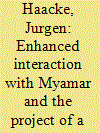

|
|
|
| 7 |
ID:
095121
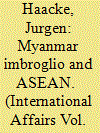

|
|
|
|
|
| Publication |
2010.
|
| Summary/Abstract |
Following the adoption of a new constitution by national referendum, Myanmar's military junta is set to organize multiparty elections in 2010. Not least to influence Myanmar's leadership, with regard to the conditions Washington believes necessary for credible elections, the United States announced in September 2009 that it would embark on a new approach towards Naypyidaw. This will focus on a high-level dialogue while keeping existing sanctions in place. The Obama administration has asked the Association of Southeast Asian Nations (ASEAN) to support this new approach. Against the backdrop of the deep divide between the ruling generals and Aung San Suu Kyi, and the continued conflict between Naypyidaw and armed ethnic nationalities, this article asks: How strong is ASEAN's record when it comes to influencing the State Peace and Development Council (SPDC) in relation to matters of national reconciliation and political transition? What factors explain ASEAN's approach towards Myanmar? What prospect, if any, is there that ASEAN states can influence Myanmar's political developments before the 2010 elections? The article argues that ASEAN has not moved beyond a collective criticism which aims to induce Naypyidaw to respond positively to the demands of its international detractors. ASEAN's norms, different political identities and geopolitical interests coupled with the SPDC's prickliness have limited the consensus on Myanmar. Naypyidaw's calculations about relations with Washington, rather than ASEAN's 'enhanced interactions' with the military government, and domestic political dynamics are likely to be the crucial determinants of further developments in the context of the 2010 elections.
|
|
|
|
|
|
|
|
|
|
|
|
|
|
|
|
| 8 |
ID:
075108
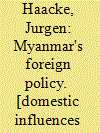

|
|
|
|
|
| Publication |
London, IISS, 2006.
|
| Description |
128p.
|
| Series |
Adelphi Paper 381
|
| Standard Number |
0415407265
|
|
|
|
|
|
|
|
|
|
|
|
Copies: C:1/I:0,R:1,Q:0
Circulation
| Accession# | Call# | Current Location | Status | Policy | Location |
| 051927 | 327.59/HAA 051927 | Main | On Shelf | Reference books | |
|
|
|
|
| 9 |
ID:
085125
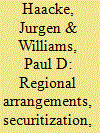

|
|
|
|
|
| Publication |
2008.
|
| Summary/Abstract |
This article seeks to contribute to debates about how regional arrangements construct and respond to threat agendas. It does so by using the literature on the concept of securitization to explore the processes through which the African Union (AU) and the Association of Southeast Asian Nations (ASEAN) have dealt with contemporary transnational challenges. After providing an overview of the Copenhagen School's (CS) understanding of securitization, we examine the main problems and limitations that emerge when attempting to apply the concept of securitization to regional arrangements in the developing world. The article explores in particular the extent to which the AU and ASEAN have securitized the transnational challenges on their agendas. We conclude that in both cases the impact of security culture as well as unresolved conceptual and methodological issues raise significant questions when seeking to apply securitization theory outside of Europe.
|
|
|
|
|
|
|
|
|
|
|
|
|
|
|
|
|
|
|
|
|